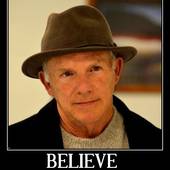
Don’t be a fool about your money
You only see your money in small portions. Very few people walk around with a “gangsta” bank roll. The use of credit/debit cards has all be erased the use of actual cash from our mind. There is a downside to that scenario. Sure, it is much easier to have your paycheck direct deposited. It is much faster to pay for that latte with a debit card. It is more convenient to pay for parking with your credit card instead of feeding coins into meters.
But, while you move so financially smoothly through your day, you become somewhat inured to the amount of money involved in living. It is quite possible to become fascinated with your bank statement (on-line of course) at the end of each month. You might even be checking your balances with your smart phone every so often. You may even have a budget.
Here’s the problem. You are focused on today. You know how much you make. You have a general idea of what it costs to live in the area. Now, those costs do rise on a regular basis. Forget the Government double speak of leading cost indicators. The change is so subtle it slips past your consciousness and the impact is rarely felt until the erosion of your personal buying power slaps you upside the head. Of course, most people re-calculate and re-budget. After a period of time they either find a better paying job or receive a raise and the financial comfort level returns.
At some point, many make the decision to purchase a home. There are many reasons and each of them is valid. Regardless of the reason, the current outlay for rent will be replaced by a mortgage payment. Rent is usually a pretty big chunk of your monthly income. It may or may not include utilities and amenities. It is one monthly figure that usually remains pretty constant during the terms of your lease. You pay one monthly figure. Your landlord handles paying the expenses associated with the property. Sure, he sets some aside for profit and then he pays taxes, building insurance, utilities (those that are not billed to you directly) , a mortgage (if one still exists) and general maintenance. If you are paying $3,000 per month in rent, you don’t see the breakdown in how that payment is split up.
You want to purchase a home. OK.
Don’t be a fool about your money. If you feel that you have that $3,000 a month for housing, that is not the amount of money you should plan to pay for your mortgage. For a moment, let’s set aside the fact that you must have at least around 6% of the purchase price in cash on hand (note, this is a very low figure. The less cash you put down, the higher your monthly mortgage payment will be). You have to subtract future monthly expenses from the amount you think you have available. There is an anachronism, PITI, that is bandied about in the mortgage industry. more . . .



Comments(1)